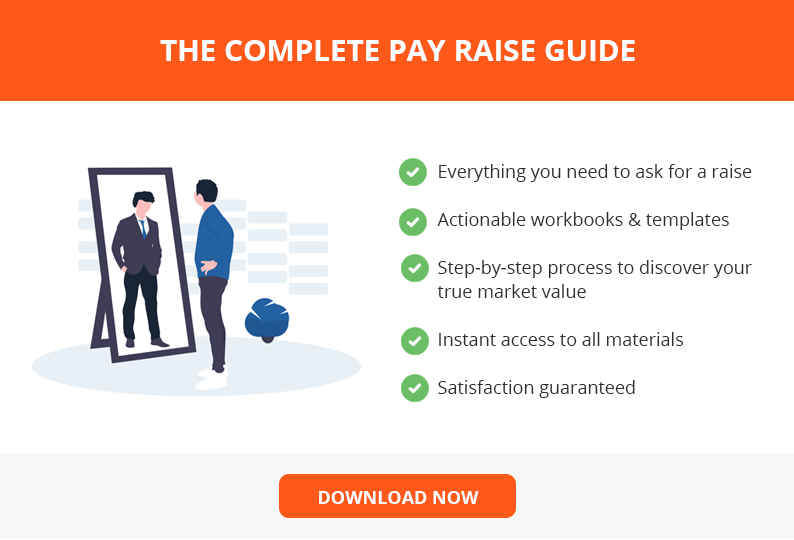Asking for a raise can be a stressful situation, but is often necessary to advance your career and achieve success. The question is where do you start? Do you know what to mention when asking for a raise and how to best position yourself for advancement? If you want to know exactly what to say and how to ask your manager for the raise you deserve, we have helpful tips and a sample email that will give you the confidence you need!
Our article includes exactly what to write. We even included samples throughout!
Is it appropriate to ask for a raise over email?
This is a completely valid question with a range of answers. You might be wondering if it is appropriate to ask for a raise over email. Is it better to do it in person? A good way to know if an email is appropriate is by considering how your team communicates on a day-to-day basis. If you are mostly remote and communicate via email for the better part of the day, this is a good indicator that an email to your manager will be acceptable.
If you work in an office where you speak directly with your team and manager every day, it might be better to ask for a raise in person. This isn’t a hard and fast rule though. If you think your arguments for a raise are going to be more persuasive over email, then go for it!
What are the advantages of asking over email?
When you ask for a raise, it is important that your arguments and points are well-organized and solid in order to convince your manager that your performance deserves commendation. Writing an email that lists all of your points in concise and influential language can be an advantage when asking for a raise. This form gives you time to organize your thoughts and present your best case to your manager.
There are also certain benefits for your manager if you ask for a raise over email; they have a written record of your evaluation of your performance as well as unlimited time to review your request and acknowledge your arguments. This increases your chances of your manager responding positively to your request; and even if you don’t get the raise immediately, you now have a written account of the request for future records.
Writing your email: what to include
There are 6 major components that you should be sure to include in your email that are the keys to successfully asking for a raise. They are:
- Happiness and Loyalty to the company
- Responsibilities and additional contributions
- Key accomplishments
- Comparative pay evaluation
- Make the ask
- Follow up
We will go over each of these sections and provide examples of what to include in your email; giving you a sample email and outline of what to send to your manager.
1. Happiness and Loyalty
It’s always a good idea to start your email off by explaining your feelings towards the company and how you are happy in your current position. This is going to reinforce your manager’s ideas of your commitment and loyalty to the company, making them more likely to think of you favorably.
Examples of things you could say to express your happiness:
“I’ve worked here for X number of years and have found much success and fulfillment within my position”
“I have been thinking recently about my future here and my role in the growth of this organization”
“There are many elements to my job here that I enjoy and I would like to see the organization grow, as well as see my own personal development here.”
These are all examples of good ways to open your email. When asking for a raise, you need to make your manager feel like you have a personal stake in the success of your team and the organization as a whole. If you express that you enjoy your position and want to remain happy and fulfilled in your role, they will understand why you are asking for a raise.
2. Responsibilities and Contributions
Your contributions and job performance are what is most important to your manager when they are considering giving you a raise. The best way to express your exceptional performance is by highlighting the ways you have taken on additional responsibility in your position and the contributions you have made that make you a great employee.
Some examples of things to include in this section:
“Over the past year, I have taken on additional responsibility in X ways, that shows my commitment beyond by job description.”
“My contributions to the role have surpassed expectations in X way (Possible areas include: sales, organization, leadership, time commitment, over-time work, efficiency in completing projects)”
One important thing to mention when talking about your responsibilities and contributions is how your pay should be a reflection of the work you have been producing and are going to continue to produce. This reminds your manager that the things you have done to go above and beyond are worth monetary value to them in terms of productivity and to the organization as a whole.
An example of how to explain this:
“The additional responsibilities I have taken and my overall contributions have helped our team immensely, and I would like my salary to be a reflection of that.”
Don’t be afraid to speak kindly about yourself and your contributions in this section. Much like a job interview, the person reading the email needs to be convinced why you are good at what you do. Show why your performance deserves a raise. Use words that link your performance to productivity and time. This will remind your employer that you are saving them time and producing more by taking on these responsibilities.
3. Key accomplishments
In order to really drive the point home, you also want to list some key accomplishments. These are things you have done in the past year that have had direct influence on your team and the organization as a whole. Showcase these wins to make you an exceptional employee deserving of a raise.
These can be written as a list or in bullet points; the format you choose should be based on how many accomplishments you have to list, as well as which points you are trying to emphasize the most.
Here is an example of a bullet-point list:
- Completed project X in excellent time; leading to more time for the team to implement higher value activities
- Organized meetings surrounding X, ensuring team was on the same page
- Spent over-time working on X to complete it by the deadline; helping meet quarterly goals
- Reviewed and Edited materials for X, uncovering errors and saving time.
These are examples of going above and beyond that will demonstrate your accomplishments. Doing so in a bullet-point list will also make your manager feel like there are many examples of your accomplishments. As they read the email, this will certainly leave an impression! You should always make sure to highlight how your accomplishments have benefited the team or organization that you work for; accomplishments mean nothing if your manager cannot tangibly see the benefits.
4. Compare your salary
In order to make a better argument for a raise, you should do some research into what the average salaries are to those in your field. You’ll want to see how you compare. If there is a discrepancy, you will be able to include this in the email. It will show your manager know that your work is deserving of more pay.
Another thing that can help is if you are able to find the average salaries of your position. There are many websites where people share their salaries anonymously. You can see these in order to help other workers get paid a fair amount. If you notice that there are people with similar experience to you who make more in your position at your organization, this may also be something good to mention. Be aware of differences in location or experience though. People living in expensive cities will be paid more.
Want to figure out how much to ask for? Read our guide! How much of a raise to ask for.
Examples of how to include this in your email:
“After some research into what people make on average in my position, I have found that the average salary is X, which is X% higher than my current salary.”
“Since my salary was established, I have gained more experience in the role and shown my value as an employee who goes above and beyond; for those with my current level of experience, the average salary is X, which is X% higher than my current salary.”
Don’t be afraid to mention numbers and talk about money, especially in this scenario. Your manager already knows how much you make. But they may not. And maybe your manager knows what the industry average is. But if you bring it to their attention, they are going to have to respond appropriately. This is the time when talking about money matters. You should be ready to ask for what you deserve!
5. Make the ask
Actually asking the question is an important step of the process, and one that often gets overlooked. Making sure you mention your accomplishments and contributions again, while actually phrasing your request as a question, is how you should sum up your arguments. Asking your manager a question is going to force them to give you an answer; you don’t want to send a vague email highlighting your contributions without actually asking for the raise!
An example of a good question:
“Given my performance and contributions, as well as what people with my experience make in this position, I would like to ask you for a raise of X%.”
Ending your question with an additional “I would like to know what you think?” or “Does this sound acceptable?” will help soften the question and make it seem reasonable and professional.
Want to calculate a pay raise? Use our pay raise calculator.
6. Establish a meeting
Last, the final thing you should do in your email is give your manager the option of how and when to follow up, after they’ve had some time to consider your request. You need to ensure that they know you would like to discuss this matter further. You want to hear back from them once they’ve been able to review what you are asking for.
Examples are:
“I would love to meet after you’ve had time to consider my request to discuss further”
“I’d like to talk more when you have a chance to meet”
Also be sure to end the email with a “Thank you”. This may seem like it goes without saying, but it’s important to not forget it! Make sure they know that you appreciate their consideration and time!
You can do this! If you want more details, take a look at our full guide on asking for a raise.
Visitors also search for: how to request a raise for an employee, how to ask for a bigger raise, dealing with a narcissist boss, request for pay increase letter, 5 raise calculator, when you should ask for a raise, how to write a letter to get a raise, salary promotion calculator







